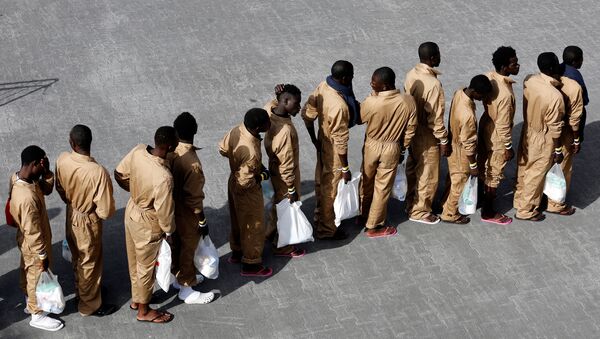"We have collected testimonies in regards to the treatment of refugees and migrants by police when they are requested to provide fingerprints," Amnesty International's Italy Researcher Matteo de Bellis told Sputnik.
The report compiled by Amnesty International (AI) in Italy includes interviews with 170 refugees and migrants since 2015.
Pestaggi ed espulsioni illegali. @matteorenzi non ignori la nostra denuncia https://t.co/Prpu4jXgVI #IWelcome #Refugees pic.twitter.com/L1Zi09BmKv
— amnesty italia (@amnestyitalia) November 3, 2016
"Traumatized refugees who have just stepped off a boat after a harrowing journey at sea are forced to provide their fingerprints at hotspots, before they are given adequate information," De Bellis said.
Castro, a 19-year-old man from Sudan arrived in Italy by boat from Libya. Castro, when taken to a police station with 22 other migrants, refused to give his fingerprints.
"Ten police came and took me, first, and hit me with a stick on both the back and right wrist. In the room there were 10 police, all uniformed. Some took my hands back, some hold my face. They kept hitting me, perhaps for 15 minutes.
"They then used a stick with electricity; they put it on my chest and gave me electricity. I fell down. I could see but not move. At that point, they put my hands on the [fingerprint] machine."
However, many migrants sought to continue their journey to other European countries, in many cases to join family members and often, to find work in wealthier norther European countries.
According to European law, migrants must stay in the country where they first enter, which is determined by where they give their fingerprints.
"They may be wrongly labeled as irregular migrants and issued expulsion orders and repatriated to countries with appalling human rights records and repatriated without checking is the person may be at risk of being persecuted," Matteo de Bellis told Sputnik.
The fast-track hotspot approach, as carried out by the Italian authorities, is a "flawed assessment," according to Amnesty International.



